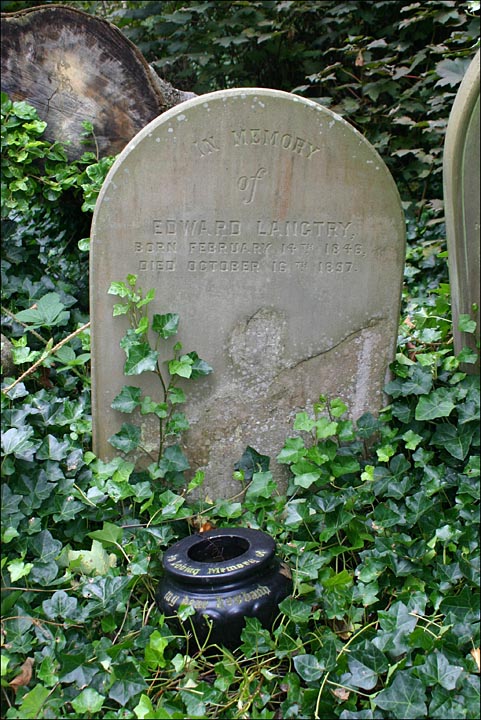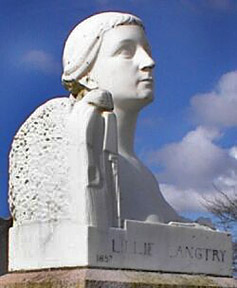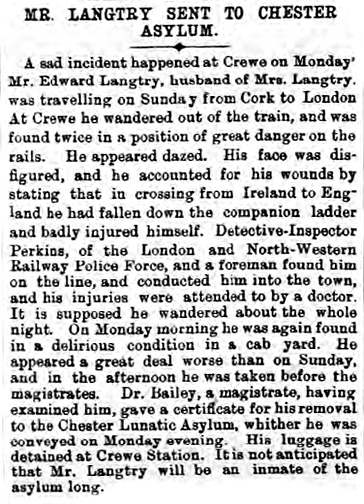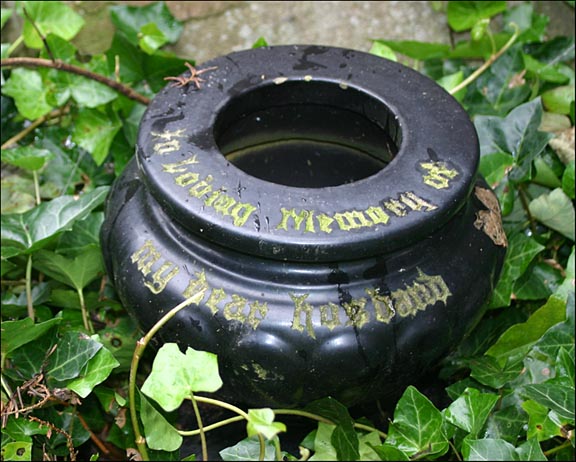From the Chester Courant, 20th October 1897:
DEATH OF MR. LANGTRY. FATAL RESULT OF A FALL.
At a few minutes after nine o'clock on Friday night Mr. Edward Langtry, the husband of the famous Mrs. Langtry, died at the Upton Asylum. It will be remembered that Mr. Langtry was admitted to the institution last Monday week, having been removed there upon the order of a Crewe magistrate. As far as can be ascertained at present, it appears that while crossing from Liverpool to Belfast Mr. Langtry either fell down the companion ladder of the steamer or tumbled off the gangway, and sustained severe injuries to his head and face, his nose being badly cut. On reaching Belfast, which was his native place, he was taken to the Royal Infirmary, where he remained under medical care for a few days.
When it was considered he had sufficiently recovered to be allowed to leave the institution, he returned by boat to Liverpool, and there took train, it is believed, for London. At Crewe, however, he wandered out of the train, and was found twice in a position of great danger on the rails. His face was disfigured, and he appeared dazed.
Detective Inspector Perkins, of the London and North-Western Railway Police Force, and a foreman found him on the line, and conducted him into the town, and his injuries were attended to by a doctor. It is supposed he wandered about the whole night.
On the Monday morning he was again found in a delirious condition in a cab yard. He appeared a great deal worse than on Sunday, and he had only a few coppers in his possession. In the afternoon he was taken before a magistrate, and having been medically examined, he was conveyed in the evening, upon a magisterial certificate, to the Upton Asylum. Here every attention was paid to him, and, though it was supposed that he was suffering from concussion of the brain, it was not anticipated by his friends that he would long remain an inmate of the institution.
On Tuesday last, however his condition gave cause for grave alarm, and he gradually grew worse, owing probably to inflammation of the brain having set in, until he expired as stated above.
THE INQUEST. SAD STORY.
The inquest was opened at the Asylum on Monday morning by Mr. J. C. Bate, county coroner, Superintendent Leah, of the Cheshire County Constabulary, also being present. In opening, the coroner said that from the information before him it appeared that Mr. Langtry was found in Crewe Station on October 3rd. He afterwards went to the hotel at the station, and was subsequently found WANDERING ABOUT THE STREETS.
The police took him to have a wound on his face dressed. After that he was thought to be a suitable inmate for the Chester Asylum, as from his manner there seemed something wrong with him. He was brought there on the Monday and since his death a post-mortem examination had been made, from which it appeared that MR. LANGTRY DIED FROM INJURIES TO HIS HEAD. The evidence before them was hardly sufficient, and he thought it would be necessary for them to adjourn the case.
A Mr. Greenwood was with deceased at the time of the accident, and they ought to have him there. Cornelius Collins, 9, Queen's-terrace, South-ampton, identified the body as that of Mr. Edward Langtry. He had known him four years, as deceased, who was 50 years old, had lodged with him for that time. Mr. Langtry made witness' home his permanent address, but lately he had been away a great deal, witness having been away with him on two occasions, once to Scotland and again to Ireland.
On Tuesday, September 28th, deceased left Southampton for London, there to join a Mr. Greenwood in a trip by the SS Sandon to Belfast, and then to Glasgow. Witness DID NOT SEE DECEASED AGAIN ALIVE. Mr. Greenwood sent a telegram for witness to go for Mr. Langtry to the Royal Hospital, Belfast. Witness went on the Saturday morning, and arrived in Belfast about seven o'clock on Sunday morning, October 3rd. He went to the hospital and enquired for Mr. Langtry. He saw the porter, who called the male nurse, the latter telling him that Mr. Langtry left the hospital on the Friday night to catch the half- past five train to Dublin. He also said he thought deceased wandered a bit in his mind, and witness said, WHY DID YOU LET HIM GO? The porter gave witness directions Mr. Langtry had written on an envelope as to how he should follow him, giving the towns of Dublin, Holyhead, Chester, &c. Witness followed the route given until he got to Chester, where he made enquiries which were ineffectual. He also wired to Euston, as Mr. Langtry had directed him, but received a reply saying that deceased was not there.
MR. LANGTRY WAS A VERY MODERATE MAN in general habits.—The Coroner: Except on occasions ?—Witness: Yes, but nothing serious. I have never known him incapable. — Proceeding, witness said he had never known deceased to be wrong in his mind before. The morning Mr. Langtry went away he received a cheque for £25 from Sir George Lewis, and witness thought he went away with the whole of the money. Mr. Greenwood said he handed him £15 of the money at Belfast.
Examined by Supt. Leah, witness said Mr. Greenwood's address was ‘Abbey Mills, Bishop's Waltham, Hants.' He had never known Mr. Greenwood to accompany Mr. Langtry on a tour before. The two were great friends. When witness asked the man at the hospital, why he let deceased go away, he received a reply something like “I could not detain him." He had no reason to know why Mr. Greenwood took charge of the money, except that Mr. Langtry might have asked him to take care of it. It was usual for deceased to receive a cheque from Sir George Lewis quarterly, and his having received one prior to his departure was no unusual thing.
The Foreman of the Jury (Mr. Joseph Price): WHY DID MR. GREENWOOD LEAVE HIM ? Witness: I could not say.—By the Coroner: Deceased had had a wound on his face before he went away, but it had healed up. The wound at present on his nose was not there when he went away.
HOTEL PORTER'S EVIDENCE. George John Taylor, night porter at the North-Western Hotel, Crewe, was the next witness. He said deceased came to the hotel a few minutes after three o'clock on the morning of October 3rd. He seemed very peculiar, and was bandaged completely from his moustache to his eyes, there being stains of blood on the bandages. Witness could not say whether he was suffering from the effeets of drink, but he was very uncertain on his feet. He asked for a bedroom, and was shewn to one. He also asked for a whisky and seltzer, but witness refused him the drink. He seemed to be WANDERING IN HIS MIND, and was not right.
Within two or three minutes Mr. Langtry came down, and wanted to know where the people were who came in with him. As a matter of fact no people came to the hotel with him except the porter who brought him off the train. After witness had assured him no one came with him from the train, he asked again for a drink. Witness replied that he could not get him a drink, as it was night. Mr. Langtry said “Oh, is it night?" He was shewn up to his room again, but he came down once more, saying there were two men in his room. Witness asked him where he wanted to go, and whether he had not better continue his journey, Mr. Langtry replying, “Yes, my boy (or lad), I will." Thereupon witness took him to the station and told them at the office that he wanted to continue his journey.
The Coroner: DID YOU NOT THINK IT WAS DANGEROUS to turn a man out in that state of mind ?— Witness: I think it was more dangerous for him to stop wandering about in an hotel full of people. I found out afterwards that he had wandered into another room.—Proceeding, witness said Mr. Langtry seemed pleased at the suggestion that he should continue his journey. He was handed over to the ticket examiner.
Shortly after eight o'clock next morning deceased came to the hotel again in the same condition. He asked for two glasses of bitter, and then for two bottles of bitter, but was refused, and he went out, that being the last time witness saw him in the hotel, although he saw him walking about in the station about an hour afterwards. Examined by Superintendent Leah: No one was expecting deceased at the hotel. He was only at the hotel a few minutes, and did not say where he was going except that his way was London-ward. There were blood stains on his handkerchief. When witness took him to the inspector at the station he said “The gentleman wants to get on. He wanders about and I cannot deal with him." His eyes and his face above and below the bandages were badly discoloured.
The Coroner: Don't you think it was unkind to put him on the railway ?— Witness: No, there are ambulance men on the railway.—But you did not give him to the ambulance men ? I gave him to the ticket- collector.—In answer to further questions witness said Mr. Langtry gave him 6d. He did not pay anything at the hotel, and witness did not see if he was in possession of much money.
Detective Inspector Perkins, stationed at Crewe, and in the employment of the London and North Western Railway Company, also identified the body. He had known Mr. Langtry between 13 and 14 years, he having been stationed at Holyhead some years ago when Mr. Langtry lived there. On October 3rd witness saw him on the platform at Crewe Station at half-past ten o'clock in the morning. His face was badly disfigured, and he had a piece of lint on his nose. One cheek was badly swollen, and altogether HE WAS HARDLY RECOGNISABLE. Witness asked him if he was Mr. Langtry, and he said "Yes," and shook hands.
On being asked how he had been knocked about, he said he had fallen down a companion ladder on one of the small boats. Witness believed he said he was crossing over to Cork at the time, but he might have meant Belfast. It was some time before he could say where he was going to; he said he had forgotten the name of the place, but subsequently he said he was going to Southampton, that he was not going through London, and that he was going round the coast. He then commenced to speak about some females in front of him, saying Who are those females ? THEY COME IN FRONT OF ME AND DANCE, and when you go to get hold of them they go through the flags." In his own mind witness thought deceased had been drinking heavily.
Mr. Langtry's face looked as if it wanted redressing. His face had apparently been dressed some three or four days. He tried to get a drink in the refreshment rooms, but as witness signalled to the waiter, he was refused. Witness saw him take a sovereign out of his pocket, and thought he had five or six more in his hands. Witness did not think he was fit to travel, and eventually took him to Dr. Stainsbury's, where his face was dressed. Witness told him afterwards to go to bed for a bit, but at dusk the same evening he found him WANDERING DOWN THE LINE at the station. He brought him back, and in reply to what witness said deceased promised to get a little refreshment. He, however, walked to the other end of the platform, and when witness told him he would be getting killed, he said he was all right, and knew what he was doing. Ultimately witness succeeded in getting him away, and accompanied him to within fifty or sixty yards of the Royal Hotel, deceased then saying he would be all right.
He saw Mr. Langtry at the police-station next morning, when he saw that the bandages put on by Dr. Stainsbury had been torn off. At times Mr. Langtry would speak quite rationally and sensibly, but he did not say anything important at those times. He had a difficulty in recognising his bags, which were in a waiting room, at first saying they were not his, and afterwards admitting that they belonged to him.
Sergt. Currie, Crewe, said a police constable brought deceased to the police station from the doctor's on the Sunday morning. He appeared to have been drinking, but said he had fallen down the stairs leading from the top deck of a boat.
He also stated he had been married 25 years, that his wife had HAD A DIVORCE FROM HIM, and had had to go to the colonies to get it. At ten o'clock on the Monday morning witness found him on some straw in Mr. Price's cabyard, Mill- street. He was placed on an ambulance and taken to the police station, where he was attended by Dr. Bailey, an order being made out for his admission to Chester Asylum.
When witness searched him at the police station on the Monday, he found lljd. in coppers on him, and a railway ticket, which witness believed was for Southampton. On the Sunday deceased paid 11s. to the doctor, and a constable had told witness that he paid the money out of a sovereign, and that he had four or five other sovereigns in his waistcoat pocket.
In answer to Supt. Leah's questions, witness said he smelt strongly of drink, and was treated accordingly, being given tea and made comfortable. Witness had heard that deceased was found in a field on the Monday morning by a railway man, and that by his side was a railway ticket. He had not heard where deceased was from the time Detective-Inspector Perkins left him on the Sunday night until the Monday morning. Had they thought he was suffering mentally, they would not have let him go from the police station.
Dr. Lawrence, chief doctor at the Asylum, said deceased was brought to the institution on the 4th inst. His face was much disfigured and bruised, his nose was cut, and the wound filled with coagulated blood, and, he believed, a little lint. The left side of his face was more injured than the right, and such wounds would have been most likely caused by a fall. He was wrong in his mind, and could not tell anything about himself. He was rather better the next morning, and improved in his mind for two or three days, being able to say on either the third or fourth day that he had fallen down, and, on being questioned, said he might have had drink.
A day or two afterwards he said someone had robbed him of £15, which he had placed on the chimney- piece. Next day he was worse, and kept throwing his clothes off, also saying his sister was in the next room. HE DIED ON FRIDAY NIGHT, a little after nine o'clock. Since then witness had made a post-mortem examination, and found that death was due to effusion of blood on the brain. It had been a gradual oozing from ruptured capillaries, a clot having formed. These were the results of injuries received, and from appearances were quite sufficient to account for the symptoms described by the previous witnesses.
Mr. Langtry might have taken a little drink after having received the injuries, and the symptoms would have been aggravated in consequence. It would be a natural thing for anyone who smelt drink upon him to think, under the circumstances, that he was drunk. Deceased's heart was slightly diseased, as well as the commencement of the large artery, but not sufficiently to account for death. Henry Stokes attended deceased every night he was in the asylum. The inquest was adjourned for a week.
CONCERNING MRS. LANGTRY. Men and Women of the Time' says:—Lillie Langtry, actress, is the daughter of the Rev. W. C. Le Breton, Dean of Jersey, and was born in 1852. In 1874 she was married to Mr. Langtry, a native of Belfast, and about 1881, after having been for some years celebrated for her beauty in London Society, determined to go on the stage. Mrs. Langtry made her first public appearance on Dec. 15, 1881, at the Haymarket Theatre, in ‘She Stoops to Conquer.' In January of the following year, Mr. and Mrs. Bancroft engaged Mrs. Langtry to play at the Haymarket Theatre, and she appeared in the character of Blanche Haye in Robertson's play of ‘Ours.' She appeared as Rosalind in ‘As You Like It' at the Imperial Theatre on Sept. 23, 1882, and subsequently went to America.
Mrs. Langtry has twice leased the Prince's Theatre (now the Prince of Wales' Theatre). At the end of the summer season of 1885 she went once more to America. In 1891 she leased the Princess' Theatre in London, and appeared as Cleopatra in Anthony and Cleopatra.'
MRS. LANGTRY'S REPORTED ENGAGEMENT. A correspondent writing before Mr. Langtry's death said:—No surprise is felt by persons acquainted wih the circumstances at the announcement that the marriage said to have been arranged between Mrs. Langtry and Count Louis Esterhazy will not take place. Before such a marriage could be celebrated, the Prince must obtain the consent of the Emperor of Austria, and this certainly would have been refused. At the same time, the mairiage would have raised an awkward question in connection with the divorce which Mrs. Langtry had obtained in America. That divorce, it is said, only applied to the State in which it was obtained. It certainly would not apply in England. So strong is the opinion on this point that it is held that if Mrs. Langtry had married again in this country she would have been liable to have been prosecuted for bigamy.
As to the question of money, great as is the wealth of the Esterhazy's, it could not be a great object to Mrs. Langtry, seeing that she is now a rich woman, to say nothing of the twenty thousand pounds she won at Newmarket on Wednesday.
MR. LANGTRY AND HIS WIFE. Detective Perkins has made the following statement to a correspondent of the Star: "I had frequent intercourse with Mr. Langtry while he lived at Holyhead, where I was for some time stationed. Mrs. Langtry often passed through to and from Ireland. On every occasion he knew the time she would arrive, and was invariably at the station some hours before the train or boat was due. He would walk up and down, growing more and more excited until half an hour before the time of her arrival. Then he would single out a porter and say, Boy, I can't stick it any longer. Watch her for me. Look closely at her; tell me how she looks; does she look well ? Is she as beautiful ? What she wears. Be careful about her dress, and tell me all about it.' Then he would dart out of the station. After the train or boat had gone he would come back and question the porter most minutely, and sob as if his heart would break as he learned the details, and walk off the station sobbing, and apparently dazed. I have seen tears come into the eyes of the porters, said Perkins, at the exhibition of his emotion.
When I found him at Crewe he was standing leaning against a post on the station, and his face was so battered that he was almost unrecognisable. Long as I had known him, it was only when he spoke and I saw him walk that I was able to tell who it was. I went up and said, Langtry, how did this happen ?' He replied, in a rambling kind of way, as though speaking to himself, They thought they knocked me out this time, but they didn't.
The Press Association says: Messrs. Lewis and Lewis, solicitors, of London, have written to the Chester Lunatic Asylum authorities stating that they are acting on behalf of Mrs. Langtry, and the fullest inquiry must be made into the circumstances of Mr. Langtry's death.
THE FUNERAL. The interment of Mr. Langtry's remains took place at the Cemetery yesterday (Tuesday) afternoon, there being a fairly large number of spectators present at the Cemetery gates. Otherwise the funeral was an extremely quiet one. Dr. Hollis and Mrs. Hollis (Mrs. Langtry's sister) were the only relations who attended, the others being Mr. Cornelius Collins, with whom deceased lodged at Southampton and Dr. Renton and Mr. A. B. Hornby representing the Asylum authorities. Mrs. Langtry sent a beautiful wreath of lilies of the valley, violets, &c., tied with purple ribbon; while Dr. and Mrs. Hollis sent two wreaths and a cross.
|

 Here is the grave of poor Edward Langtry, the ill-used husband of a superstar of her day, Lily Langtry, the 'Jersey Lily'. In 1897, separated from his notorious wife- who was, at the time, otherwise engaged with Edward, Prince of Wales (later to become King Edward VII)- he had been discovered wandering "bruised and dazed" around Crewe railway station. Previous to this, he had apparently sustained a mysterious injury during his voyage from Ireland. He was duly committed to the Chester Lunatic Asylum (now the psychiatric wing of the Countess of Chester Hospital) where he died nine days later.
Here is the grave of poor Edward Langtry, the ill-used husband of a superstar of her day, Lily Langtry, the 'Jersey Lily'. In 1897, separated from his notorious wife- who was, at the time, otherwise engaged with Edward, Prince of Wales (later to become King Edward VII)- he had been discovered wandering "bruised and dazed" around Crewe railway station. Previous to this, he had apparently sustained a mysterious injury during his voyage from Ireland. He was duly committed to the Chester Lunatic Asylum (now the psychiatric wing of the Countess of Chester Hospital) where he died nine days later.

